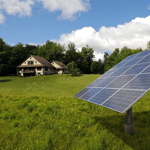Building the first net-zero hotel in North America is an ambitious goal, and the developers of the Green Leaf Inn are getting a major boost in that effort from a third-party power purchase agreement (PPA) with Community Green Energy. The agreement is seen by both parties as a clear win-win. “The use of PPAs allows building owners to get immediate savings over traditional energy costs for light, heating, cooling, and hot water with no up-front investment,” says Fritz Kreiss, co-owner of the Green Leaf Inn in Delavan, Wisconsin, which is near Lake Geneva, a popular summer getaway location. Beyond the cost savings, a net-zero hotel, which relies on renewable energy resources, would be difficult to achieve if the only financial incentives for ROI were tax credits.
A tight building envelope gives the project a good starting point for reduced energy consumption. The PPA makes adding photovoltaic panels, a geothermal system, a solar thermal system, LED lighting, a biomass boiler, and other features possible. “All these systems will have their own PPA, satisfying the goal of delivering the energy needed at very cost-competitive pricing,” Kreiss says.
Project Roster
At the Green Leaf Inn, Community Green Energy, which made possible the installation of the SunTrac solar panel (pictured above), is an important player, but plenty of others play substantial roles. Equipment manufacturer All Earth Renewables, for instance, produces the dual-access tracker, and the Community Green Energy Investor Network is another important resource. In addition to energy savings, a competitive bid process helped to reduce costs further. This process identified local vendors including Anderson-Ashton for general construction and foundations, Faith Technologies for electric contracting, KMG Mechanical Technologies LLC for plumbing, and Westenn Mechanical Contractors Inc. for mechanical contracting.
Kreiss notes that the energy savings are evident immediately when it comes to costs for hot water, heating, cooling, and lighting, and the PPA also offers a measure of protection against future spikes in energy costs. Ultimately, the dollars saved in energy costs can be applied to other aspects of the hotel, which will help with operating costs, but mostly, those savings will directly benefit guests. “Lowering our energy costs and initial capital investment also means we can put more into guest attractions and services while at the same time keeping our rates competitive,” Kreiss explains.
Community Green Energy was an ideal partner for the endeavor, Kreiss says because it was able to build a package of efficient systems tailored to the property’s unique specifications. “Community Green Energy combined our needs with the right energy technology options and third-party financing, making all our energy systems affordable,” Kreiss says. In addition to the equipment covered by the PPA, the Green Leaf Inn features a wind turbine that is self-financed through more conventional means.
PPAs aren’t new to the green scene; they’ve been around since the early 1990s, but the recent uptick in interest in renewable energy along with a challenging economic climate have made the agreements even more attractive to people and developers looking to install green systems in homes, hotels, and office buildings. Not only do PPAs reduce the capital investment, they also cut maintenance costs and provide marketing opportunities.
The Green Leaf Inn’s PPA doesn’t just offer the hotel’s owners a more affordable way to go green, it also serves as an example for future hotels of this kind. “We want to show other hotel and building owners a way to save money and invest in green energies that not only help the environment, but also serve the needs of the green-minded guest as well,” Kreiss says. “It’s better for the environment, it’s cost-competitive, and it’s better for the local economy because the more money we save, the more money is turned back into the local economy.”

